Adolf Fick
Adolf Fick (1829–1901) was a German physiologist who made significant contributions to the fields of physiology and ophthalmology. He is best known for formulating Fick's laws of diffusion, which describe the rate at which a substance diffuses from an area of high concentration to an area of low concentration. Fick's work laid the foundation for our understanding of diffusion processes in biological systems.
Early Life and Education[edit | edit source]
Adolf Fick was born on September 3, 1829, in Kassel, in the Electorate of Hesse (now Germany). He pursued his education in medicine at the University of Marburg and later at the University of Berlin, where he was influenced by the teachings of Johannes Müller, a renowned physiologist of the time. Fick completed his medical degree in 1851.
Career and Contributions[edit | edit source]
After completing his studies, Fick began his career in physiology. In 1855, he introduced the concept of Fick's laws of diffusion, which became a cornerstone in the study of cellular biology, pharmacology, and respiratory physiology. These laws quantitatively describe how substances diffuse across a membrane, a process vital to understanding how gases exchange in the lungs and how drugs distribute within the body.
In addition to his work on diffusion, Fick made significant contributions to the field of ophthalmology. In 1888, he invented the first practical contact lens, which was made of glass and covered the entire eye. Although modern contact lenses have evolved significantly since Fick's initial design, his invention marked the beginning of the development of contact lenses as we know them today.
Fick was also interested in the mechanics of muscular movement and the heart. He developed the Fick principle, a method to measure cardiac output by analyzing the concentration of substances in the blood. This principle remains a fundamental concept in cardiovascular physiology and is used in various medical diagnostics to assess heart function.
Later Life and Legacy[edit | edit source]
Adolf Fick continued to work and teach in the field of physiology until his retirement. He passed away on August 21, 1901, in Blankenberge, Belgium. Fick's contributions to physiology and ophthalmology have had a lasting impact on the medical and scientific communities. His work on diffusion and the Fick principle are still taught in medical and biological sciences courses around the world.
Fick's legacy is remembered through the continued use and application of his laws and principles in various scientific and medical fields. His pioneering work in the development of contact lenses has also left a lasting mark on the field of ophthalmology, improving the quality of life for millions of individuals who benefit from vision correction.
See Also[edit | edit source]
Navigation: Wellness - Encyclopedia - Health topics - Disease Index - Drugs - World Directory - Gray's Anatomy - Keto diet - Recipes
Search WikiMD
Ad.Tired of being Overweight? Try W8MD's physician weight loss program.
Semaglutide (Ozempic / Wegovy and Tirzepatide (Mounjaro / Zepbound) available.
Advertise on WikiMD
WikiMD is not a substitute for professional medical advice. See full disclaimer.
Credits:Most images are courtesy of Wikimedia commons, and templates Wikipedia, licensed under CC BY SA or similar.Contributors: Prab R. Tumpati, MD

